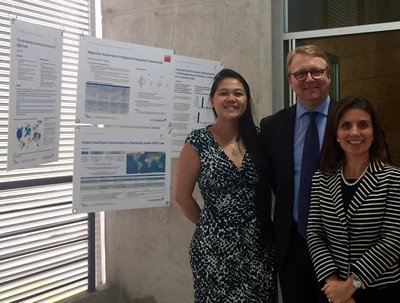1 Jul 2016
NCCR Trade Regulation showcased at WTO workshop in Costa Rica
WTI faculty and researchers took part in the Advanced Workshop of the World Trade Organization (WTO) held in San Jose, Costa Rica, from 20 to 24 June at which NCCR research was highlighted.
The workshop was organized by the School of Public Administration at the University of Costa Rica and the School of International Relations at the National University of Costa Rica.
Pierre Sauvé, one of the world’s top experts on trade in services and regional integration who serves as the World Trade Institute’s Director of Programme Development and a faculty member in the MILE, was one of the workshop leaders.
He was joined by Jorge Miranda, who specialises in trade remedies at King & Spalding in Washington, DC and was formerly a senior WTO official in standards-related matters; and Alejandro Gamboa-Alder, an expert on market access and trade facilitation, who is responsible for the WTO Council for Trade in Goods, and its Committee on Import Licensing and technical assistance activities in customs matters, trade facilitation, tariff negotiations, rules of origin and import licensing..
The three experts delivered a series of lectures and presented a number of case studies aimed at workshop participants drawn from academia (both faculty and students), and private sector representatives.
Also participating and contributing to workshop discussions were a number of senior officials from the Ministry of Economy, Industry and Trade of Costa Rica (MEIC), and the Ministry of Foreign Trade of Costa Rica (COMEX). They were joined by trade experts from Colombia, El Salvador, Guatemala and the Dominican Republic.
The impact of mega-regional on third countries, notably those in Central America, and the growth opportunities and regulatory convergence effects flowing from such agreements, notably in the realm of services trade, was one of the key workshop themes in discussions led by Pierre Sauvé.
He also addressed these themes in a separate presentation before members of the Costa Rican Chamber of Industries, in which former WTI Visiting Fellow Carolina Palma from Pacheco Cotto, one of Cota Rica’s leading law firms, also spoke.
On the trade defence front, the workshop focused attention on latest jurisprudential developments in the areas of safeguards, antidumping, subsidies and countervailing measures. Finally, in the module of market access and trade facilitation, particular emphasis was laid on the implementation challenges flowing from the WTO’s Agreement on Trade Facilitation.
A joint initiative of the graduate programme on Customs Administration and Foreign Trade led by MILE 13 graduate Susanna Wong at the University of Costa Rica and that on Trade and International Relations at the National University of Costa Rica, the workshop benefited from the substantive support of the WTI’s NCCR Trade Regulation, showcasing a number of research themes taken up in Bern in recent years.
During the workshop, posters from various NCCR-Trade Regulation work packages were presented, notably that dealing with Preferential Trade Agreements.
Further info
Sauvé, Pierre
MILE 13, Susana Wong Chan


